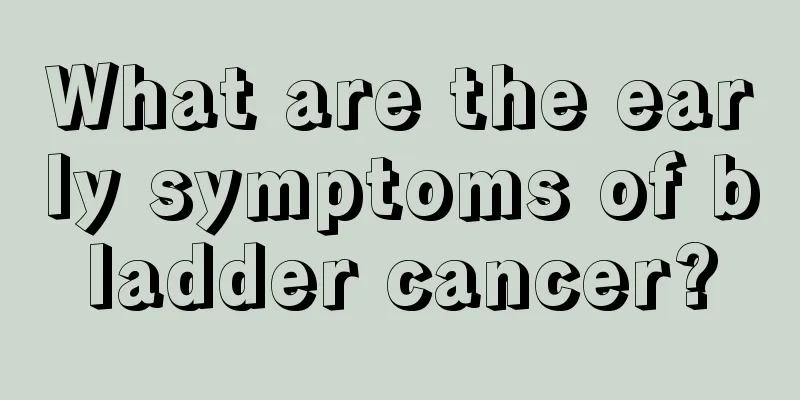Do you know the symptoms of colon cancer!

|
Intestinal cancer is usually asymptomatic in the early stages. Symptoms only appear as the cancer grows in size and produces secondary lesions. The main symptoms are: (1) Gastrointestinal dysfunction: decreased appetite, abdominal discomfort, fullness, constipation, diarrhea, or alternating diarrhea and constipation. ... Intestinal cancer is usually asymptomatic in the early stages. Symptoms only appear as the cancer grows in size and secondary lesions develop. The main symptoms are: (1) Gastrointestinal dysfunction: decreased appetite, abdominal discomfort, fullness, constipation, diarrhea, or alternating diarrhea and constipation, etc. (2) Symptoms of intestinal obstruction: mainly abdominal pain, constipation, abdominal distension, vomiting, hyperperistalsis, and sometimes intestinal type. (3) Bloody stool: This is the main symptom of colon cancer and the first and most common symptom of rectal cancer. The amount and nature of bleeding vary depending on the location of the cancer. Long-term bleeding can cause secondary anemia. (4) Abdominal mass: It is usually caused by cancer itself, but it can also be caused by intra-abdominal metastasis or inflammatory infiltration. The intermittent appearance of the mass often indicates incomplete intestinal obstruction. (5) Systemic symptoms: Patients may have varying degrees of anemia, malnutrition, systemic failure, weight loss, and cachexia. (6) Other symptoms: Cancer infection can cause chills and fever; perforation can cause diffuse or localized peritonitis; invasion of the urinary system can cause urinary system symptoms. In the late stage, liver enlargement, jaundice, ascites, left supraclavicular lymph node enlargement and other unique symptoms of organ metastasis may occur. In addition, the clinical manifestations may vary depending on the location of the cancer. (1) Right colon cancer: The main symptoms are indigestion, fatigue, loss of appetite, diarrhea, constipation, alternating diarrhea and constipation, abdominal distension, abdominal pain, abdominal tenderness, abdominal mass and progressive anemia. The location of the abdominal mass depends on the location of the cancer, such as cecal cancer in the right lower abdomen, ascending colon cancer in the right abdomen, hepatic flexure cancer in the right upper abdomen, and transverse colon cancer near the umbilicus. In addition, there may be fever, weight loss, etc. In the late stage, there may be complications such as intestinal perforation and localized abscess. (2) Left-sided colon cancer: Since the sigmoid colon is the narrowest and forms an acute angle with the rectum, and since the stool has already solidified in the left colon, it is easy to form stenosis. It often presents as chronic progressive intestinal obstruction, and most patients have intractable constipation, and may also have an increased frequency of bowel movements. Since the obstruction is mostly in the lower part of the sigmoid colon, vomiting is mild or absent, while abdominal distension, abdominal pain, bowel sounds, and intestinal patterns are obvious. When the cancer ruptures, the outside of the feces may be stained with blood or mucus, and even pus may be discharged. The intestinal tract proximal to the obstruction may form ulcers or even perforations due to persistent and significant swelling, ischemia, and hypoxia. In addition, massive intestinal bleeding and intra-abdominal abscess formation may occur. (3) Rectal cancer: The main symptoms are increased frequency of bowel movements, thinner stools, blood and mucus, accompanied by a feeling of tenesmus or incomplete defecation. When the cancer spreads to the rectum and invades the sacral plexus, severe pain may occur. If the cancer involves the prostate or bladder, symptoms such as frequent urination, urgency, pain, difficulty urinating, and hematuria may occur, and fistulas leading to the bladder or female internal reproductive organs may form. Rectal cancer can also cause intestinal obstruction. Colon cancer http://www..com.cn/zhongliu/ca/ |
<<: Teach you to recognize the early symptoms of colorectal cancer!
>>: What are the common clinical symptoms of lymphoma
Recommend
Three major diagnostic methods for gastric cancer
Gastric cancer is a type of cancer that occurs in...
Laparoscopic surgery for ovarian tumors
Laparoscopic surgery for ovarian tumors Laparosco...
Is fat really harmful and has no benefits? Rehabilitate the case for fat
When it comes to fat, many people who love beauty...
Can I exercise if I have uterine cancer?
Cervical cancer is the most common gynecological ...
Can lymphoma be cured in its early stages? How to care for it?
Lymphoma is an immune system disease. Generally s...
What is the difference between Tremella and Snow Fungus
When it comes to Tremella fuciformis, everyone is...
Does it hurt to plant hair?
Some people become bald as their hair becomes thi...
What are the hazards of small cell lung cancer
Small cell lung cancer is one of the basic types ...
What foods are likely to cause liver cancer? Check out the 5 dietary causes of liver cancer
Experts say that long-term alcohol abuse can sign...
I feel stuffy and painful in my chest
Some people often experience symptoms such as che...
Why do I feel hungry at night?
Many people feel very hungry at night. If they ea...
The relationship between rhinitis and pharyngitis
Rhinitis is a very common disease in people's...
How to remove ice from the refrigerator better
The refrigerator is one of our household applianc...
Experts’ introduction to cervical cancer prevention methods
Cervical cancer is a relatively serious type of f...
What is the cure rate of early pituitary tumors?
Pituitary tumor is a brain tumor. Its incidence i...









